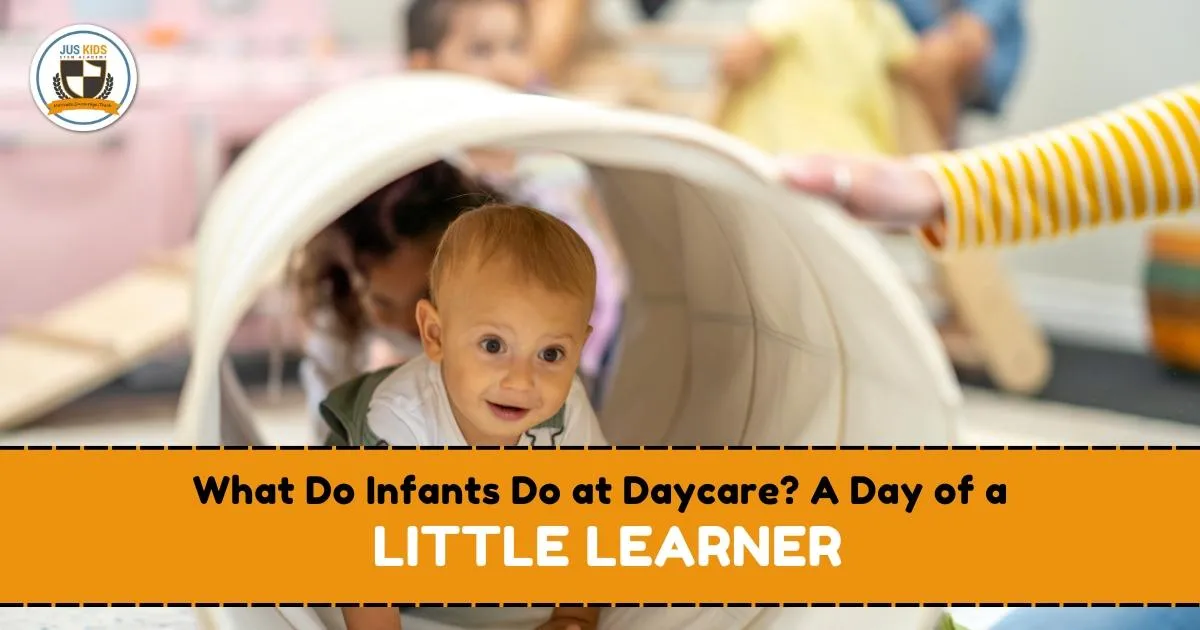
What Do Infants Do at Daycare: A Day of a Little Learner
Wondering what exactly happens during a day at an infant's daycare? It’s a question many parents ask, especially when they’re nervous about leaving their tiny one in someone else’s care for the first time. The worry about safety, proper care, and meaningful activities is real [“Are daycares safe for infants?” is a top concern.]
Here’s the part that surprises most parents: Infants at daycare aren’t just watched—they’re learning, bonding, and blooming in ways you might not expect.
Imagine dropping your baby off and wondering if they’ll get enough attention or stimulation to support their growth. But here’s the good news: a well-run daycare focuses on nurturing every little step your infant takes. Picture a day full of gentle play, comforting routines, and tiny milestones being reached with patient caregivers guiding the way.
Let’s take a closer look at what infants do at daycare and how their day is thoughtfully structured to help them thrive.
When Can You Start? How Early Do Daycares Take Infants
You might be surprised to learn that many daycares accept infants as young as six weeks old, sometimes even younger, with special arrangements. So, how early daycares take infants varies depending on the center’s policies and local regulations. Some centers are fully equipped to care for newborns right from birth, while others prefer babies to be a bit older.
At JusKids Academy, for example, we welcome little learners early on, providing specialized care designed around their unique needs. This early start helps infants develop social bonds, routines, and comfort in a new environment. Starting daycare early doesn’t mean rushing your baby; it means offering gentle, age-appropriate support at the perfect pace for them.
Are Daycares Safe for Infants? What Parents Should Know
Safety is often the first concern parents have when choosing a daycare for their infant. Whether daycares are safe for infants is a fair and important question. Good daycare centers follow strict safety protocols that cover everything from clean environments to caregiver-to-child ratios.
A safe daycare ensures that infants are supervised closely at all times, with caregivers trained in infant CPR and emergency procedures. Toys and equipment are sanitized regularly, and areas are designed to be hazard-free. But safety goes beyond the physical environment.
Emotional safety matters too, meaning caregivers provide consistent loving care and respond to infants’ needs promptly. This nurturing environment helps babies feel secure, which is crucial for their development.
A Typical Day at Infants' Day Care: Routine and Care
So, what do infants do at daycare throughout the day? Their schedule might look simple to adults, but it is packed with purposeful activities to support growth. Here’s a breakdown of a typical day in an infant's day care:
Arrival and Greeting
The day starts with a warm welcome from caregivers who know each baby by name. This moment is about reassuring your little one that they are safe and cared for.
Feeding and Diapering
Infants need frequent feeding, whether breastmilk, formula, or a mix. Daycare staff work closely with parents to follow feeding schedules, ensuring consistency. Diaper changes are also frequent, with hygiene and comfort prioritized.
Naps and Rest Time
Babies need a lot of sleep for healthy development. Infant day care includes quiet, safe nap areas where babies can rest undisturbed, often with individualized sleep routines to mimic home patterns.
Infants Daycare Activities
During awake times, infants participate in gentle activities designed to stimulate senses and encourage motor skills. Activities might include tummy time to strengthen muscles, sensory play with soft toys, or simple music sessions to engage hearing and rhythm.
Social Interaction
Even very young infants benefit from social contact. Caregivers talk, sing, and make eye contact to promote bonding and language development. Group times may include looking at picture books or sharing smiles with peers.
Departure and Parent Updates
At pickup, caregivers share updates on feeding, sleep, mood, and activities to keep parents connected to their infant’s day.
What Are Some Fun and Helpful Activities for Infants at Daycare?
Infants at daycare learn through play, comfort, and simple interactions. These activities help support their growth naturally and lovingly.
Tummy Time Fun
Lying babies on their tummies helps them build neck and shoulder strength. Caregivers add soft mats or toys to make it enjoyable.
Touch and Feel Toys
Toys with different textures, sounds, and shapes help babies explore through touch and hearing. This supports their early brain development.
Looking in Mirrors
Babies enjoy watching their reflection. Mirror play helps them learn about movement and builds self-awareness.
Music and Gentle Motion
Singing, playing soft music, or rocking helps babies relax while supporting hearing and rhythm.
Storytime and Cuddles
Even if they don’t understand the words, babies love listening to stories. It helps with early language learning and bonding.
These simple moments create a safe space for infants to explore, grow, and feel secure in their daily care routine.
How Do Daycare Providers Modify Care for Infants?
Every infant is unique. The best daycares recognize this and adapt routines to fit each baby’s needs. Whether your child needs more nap time, has a special feeding schedule, or prefers certain toys, caregivers adjust accordingly.
Communication with parents is key. Caregivers keep logs of daily activities and observations, allowing parents to share preferences and concerns. This partnership helps infants feel secure and supported as they adjust to daycare life.
Addressing Common Concerns: Are Daycares Safe for Infants Emotionally and Physically?
We touched on safety earlier, but let’s be clear: safe daycare means more than locked gates and clean toys. It means emotional safety, too. Infants need predictability, affection, and responses to their cues. Quality daycares train staff to notice when a baby is tired, hungry, or overstimulated, and respond with care.
Separation anxiety is common, and caregivers help ease this with routines that create trust. The consistency of care, such as having the same caregivers daily, builds strong bonds and reduces stress for infants.
Tips for Parents Considering Infant Day Care
If you’re thinking about enrolling your baby, here are some practical tips:
Visit several daycares and ask about caregiver qualifications, safety policies, and daily routines.
Check if the daycare allows flexible schedules for feeding and naps Modifyed to your baby’s rhythm.
Observe interactions between staff and infants during visits; warm, attentive caregivers are a good sign.
Ask about communication methods; daily reports or apps that update you, help you stay connected.
Don’t hesitate to ask about how they handle illnesses, emergencies, and special needs.
Conclusion:
Infant day care is much more than a place to stay while parents work. It’s a nurturing environment where your little learner grows, explores, and feels safe. From the moment they arrive, through feeding, naps, and play, every part of the day is designed to support their development.
Wondering how early daycares take infants or what infant daycare activities look like? Now you know that quality daycares welcome babies early and focus on personalized, responsive care that balances safety with learning through play and interaction.
If you’ve asked yourself, “Are daycares safe for infants?” rest assured that top centers prioritize emotional and physical safety, making daycare a positive experience for your child and peace of mind for you.
Explore nurturing infant daycare at Just Kids Academy, where little learners grow through care, play, and connection. Come see what makes us different.
FAQs
Q1: How do daycares handle different sleep times for infants?
Caregivers follow each baby’s sleep routine and make sure they nap in calm, cozy spots when needed.
Q2: What do daycares do to stop germs from spreading?
They clean toys, wash hands often, and wipe surfaces to keep everything safe and healthy.
Q3: Can parents share special feeding instructions or send food from home?
Yes, parents can give feeding directions and send breastmilk, formula, or special snacks for their baby.
Q4: How do daycares help infants learn to talk?
Caregivers talk, sing songs, and read stories to help babies hear new words and start learning language.
